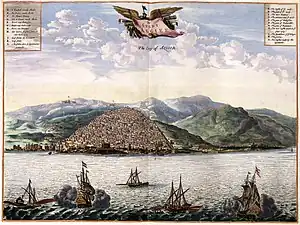Dutch-Algerian War (1716-1726)
The Dutch–Algerian war was a war that took place between 1715 and 1726 in the Mediterranean Sea for the control of trade.
| The Dutch-Algerian War (1715–1726) | |||||||
|---|---|---|---|---|---|---|---|
 View on the city of Algiers was probable published as book illustration in Amsterdam around 1700 | |||||||
| |||||||
| Belligerents | |||||||
|
|
| ||||||
| Commanders and leaders | |||||||
|
| Cornelis Schrijver | ||||||
| Strength | |||||||
| Unknown | Unknown | ||||||
| Casualties and losses | |||||||
| Unknown |
100 ships captured 1724 sailors captured. | ||||||
Background
In December 1715, Algiers initiated hostilities against the Dutch Republic. The Algerians officially cited the Dutch's perceived lethargy in ransoming their enslaved compatriots and failing to supply the promised war materials as grounds for their action. However, a cursory examination of the data underscores the substantial presence of Dutch merchant vessels in the waters of Southern Europe during the war's outbreak. Algerian corsairs had encountered a multitude of defenseless Dutch ships over several years, with only a scant few hailing from other northern nations that could be arguably deemed legitimate targets. This scenario notably favored Morocco, as it had successfully enticed numerous Algerian captains, along with their ships and crews, between 1712 and 1715 by offering the allure of potential Dutch plunder. These circumstances exacerbated Algiers predicament, coupled with the speculation that a significant portion of the ostensibly Dutch ships might have hailed from Hamburg or Scandinavia. Consequently, the Algerian leadership became increasingly convinced of the benefits in declaring war against the United Provinces.
War
War was declared in December 1715 when Algiers launched hostilities against the Dutch Republic, the Algerians officially citing the Dutch's refusal to not supply the promised war materials as the reason for their action. Between 1714 and 1715 the Algerians had captured 10 ships and their 243 sailors, but within two years, the Dutch did not respond. but in 1716 witnessed what was almost the annihilation of Dutch shipping in southern European waters, with the loss of 15 merchant ships and their 359 sailors captured by privateers. The following years were not better, the Dutch certainly had managed to make some meager catch but did not compete with Algiers who had captured from 1718 to the end of the war, 75 ships and 1122 men.[2] The Republic, which could no longer assume this war economically, refrained from negotiating with Algiers.[3]
Peace
Early in 1726, the States-General sent France and Britain a six-page memorandum in French language. Its title was Considerations which may serve to give just ideas on a defensive Alliance between France, Great Britain and the States General, for the safety of Navigation and Commerce against the Algerian's. According to him, the right nature compelled all Europeans to unite and destroy the Corsairs who practiced piracy. Their "infamous profession" was never to be at war with all the European powers at the same time, but rather to pit them against each other. While the Algerian situation seemed unrelated to the Hanover treaty's main objectives, the alliance's focus on ensuring free trade provided justification for its inclusion. After a decade of failed attempts to resolve this issue. Despite their subjects benefiting from the disruption of Dutch trade, the Netherlands sought to align with these kings due to shared interests. Moreover, the Netherlands' support for the Austrian Company made their request for British and the French assistance in negotiating peace with Algiers was reasonable. Ultimately, the Republic had to resolve to conclude a treaty with Algiers which stipulated that the Republic undertook to pay a tribute of war materials equal to 50,000 guilders in exchange for peace.[4] They Also offered 100,000 guilders to the Dey.[5]
Aftermath
After the years of war, the Dutch economy and maritime trade weakened considerably to the benefit of England, moreover, Dutch merchant ships were not immune to Barbary attacks which was frequent regardless of whether a peace treaty was sign or not.[6]
References
- Alan G. Jamieson (2013). Lords of the Sea. Reaktion Books. p. 180. ISBN 9781861899460.
- Isaac van Hoornbeek (1720–1727). Algemeen Rijksarchief, The Hague.
- Istituto internazionale di storia economica F. Datini. Settimana di studio (2014). Schiavitù e servaggio nell'economia europea, secc. XI-XVIII. p. 526.
- All of this paragraph has been written according to the website 'journals.openedition'.
- Erica Heinsen-Roach (2019). Consuls and Captives Dutch-North African Diplomacy in the Early Modern Mediterranean. p. 174. ISBN 9781580469746.
- Mededelingen van het Nederlands Historisch Instituut te Rome. Nederlands Historisch Instituut te Rome. 1927. pp. 147–182.